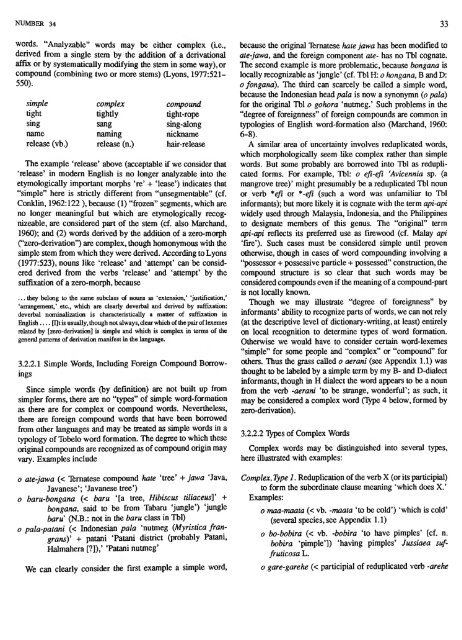The Folk Biology of the Tobelo People - Smithsonian Institution ...
The Folk Biology of the Tobelo People - Smithsonian Institution ...
The Folk Biology of the Tobelo People - Smithsonian Institution ...
You also want an ePaper? Increase the reach of your titles
YUMPU automatically turns print PDFs into web optimized ePapers that Google loves.
NUMBER 34 33<br />
words. "Analyzable" words may be eitiier complex (i.e.,<br />
derived from a single stem by die addition <strong>of</strong> a derivational<br />
affix or by systematicaUy modifying die stem in some way), or<br />
compound (combining two or more stems) (Lyons, 1977:521-<br />
550).<br />
simple<br />
tight<br />
sing<br />
name<br />
release (vb.)<br />
complex<br />
tightiy<br />
sang<br />
naming<br />
release (n.)<br />
compound<br />
tight-rope<br />
sing-along<br />
nickname<br />
hair-release<br />
<strong>The</strong> example 'release' above (acceptable tf we consider tiiat<br />
'release' in modern English is no longer analyzable into die<br />
etymologicaUy important morphs 're' + 'lease') indicates tiiat<br />
"simple" here is stricdy different from "unsegmentable" (cf.<br />
Conklin, 1962:122 ), because (1) "frozen" segments, which are<br />
no longer meaningful but which are etymologicaUy recognizeable,<br />
are considered part <strong>of</strong> die stem (cf. also Marchand,<br />
1960); and (2) words derived by die addition <strong>of</strong> a zero-morph<br />
("zero-derivation") are complex, though homonymous witii die<br />
simple stem from which <strong>the</strong>y were derived. According to Lyons<br />
(1977:523), nouns like 'release' and 'attempt' can be considered<br />
derived from <strong>the</strong> verbs 'release' and 'attempt' by <strong>the</strong><br />
suffixation <strong>of</strong> a zero-morph, because<br />
... <strong>the</strong>y belong to die same subclass <strong>of</strong> nouns as 'extension,' 'justification,'<br />
'arrangement,* etc., which are clearly deverbal and derived by suffixation:<br />
deverbal nominalization is characteristically a matter <strong>of</strong> suffixation in<br />
English |TJtis usually, though not always, clear which <strong>of</strong> die pair <strong>of</strong> lexemes<br />
related by [zero-derivation] is simple and which is complex in terms <strong>of</strong> <strong>the</strong><br />
general patterns <strong>of</strong> derivation manifest in <strong>the</strong> language.<br />
3.2.2.1 Simple Words, Including Foreign Compound Borrowings<br />
Since simple words (by definition) are not buUt up from<br />
simpler forms, tiiere are no "types" <strong>of</strong> simple word-formation<br />
as tiiere are for complex or compound words. Never<strong>the</strong>less,<br />
tiiere are foreign compound words tiiat have been borrowed<br />
from o<strong>the</strong>r languages and may be treated as simple words in a<br />
typology <strong>of</strong> <strong>Tobelo</strong> word formation. <strong>The</strong> degree to which <strong>the</strong>se<br />
original compounds are recognized as <strong>of</strong> compound origin may<br />
vary. Examples include<br />
o ate-jawa (< Ternatese compound hate 'tree' + jawa 'Java,<br />
Javanese'; 'Javanese tree')<br />
o baru-bongana (< baru '[a tree, Hibiscus tiliaceusY +<br />
bongana, said to be from Tabaru 'jungle') 'jungle<br />
baru' (N.B.: not in <strong>the</strong> baru class in Tbl)<br />
o pala-patani (< Indonesian pala 'nutmeg (Myristica frangrans)'<br />
+ patani 'Patani district (probably Patani,<br />
Halmahera [?]),' 'Patani nutmeg'<br />
We can clearly consider die first example a simple word,<br />
because <strong>the</strong> original Ternatese hate jawa has been modified to<br />
ate-jawa, and die foreign component ate- has no Tbl cognate.<br />
<strong>The</strong> second example is more problematic, because bongana is<br />
locaUy recognizable as 'jungle' (cf. Tbl H: o hongana, B and D:<br />
o fongana). <strong>The</strong> tiiird can scarcely be caUed a simple word,<br />
because die Indonesian head pala is now a synonymn (o pala)<br />
for die original Tbl o gohora 'nutmeg.' Such problems in die<br />
"degree <strong>of</strong> foreignness" <strong>of</strong> foreign compounds are common in<br />
typologies <strong>of</strong> English word-formation also (Marchand, 1960:<br />
6-8).<br />
A similar area <strong>of</strong> uncertainty involves reduplicated words,<br />
which morphologically seem like complex ratiier than simple<br />
words. But some probably are borrowed into Tbl as reduplicated<br />
forms. For example, Tbl: o efi-efi 'Avicennia sp. (a<br />
mangrove tree)' might presumably be a reduplicated Tbl noun<br />
or verb *efi or *-efi (such a word was unfamiliar to Tbl<br />
informants); but more likely it is cognate witii <strong>the</strong> term api-api<br />
widely used tiirough Malaysia, Indonesia, and die Phdippines<br />
to designate members <strong>of</strong> this genus. <strong>The</strong> "original" term<br />
api-api reflects its preferred use as firewood (cf. Malay api<br />
'fire'). Such cases must be considered simple until proven<br />
o<strong>the</strong>rwise, though in cases <strong>of</strong> word compounding involving a<br />
"possessor + possessive particle + possessed" construction, die<br />
compound structure is so clear that such words may be<br />
considered compounds even if die meaning <strong>of</strong> a compound-part<br />
is not locally known.<br />
Though we may Ulustrate "degree <strong>of</strong> foreignness" by<br />
informants' abtiity to recognize parts <strong>of</strong> words, we can not rely<br />
(at die descriptive level <strong>of</strong> dictionary-writing, at least) entirely<br />
on local recognition to determine types <strong>of</strong> word formation.<br />
Odierwise we would have to consider certain word-lexemes<br />
"simple" for some people and "complex" or "compound" for<br />
otiiers. Thus die grass caUed o aerani (see Appendix 1.1) was<br />
thought to be labeled by a simple term by my B- and D-dialect<br />
informants, tiiough in H dialect die word appears to be a noun<br />
from die verb -aerani 'to be strange, wonderful'; as such, it<br />
may be considered a complex word (Type 4 below, formed by<br />
zero-derivation).<br />
3.2.2.2 Types <strong>of</strong> Complex Words<br />
Complex words may be distinguished into several types,<br />
here illustrated witii examples:<br />
Complex, Type 1. Reduplication <strong>of</strong> die verb X (or its participial)<br />
to form die subordinate clause meaning 'which does X.'<br />
Examples:<br />
o maa-maata (< vb. -maata 'to be cold') 'which is cold'<br />
(several species, see Appendix 1.1)<br />
o bo-bobira (< vb. -bobira 'to have pimples' [cf. n.<br />
bobira 'pimple']) 'having pimples' Jussiaea suffruticosa<br />
L.<br />
o gare-garehe (< participial <strong>of</strong> reduplicated verb -arehe

















